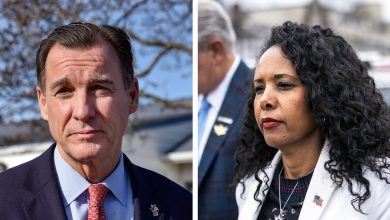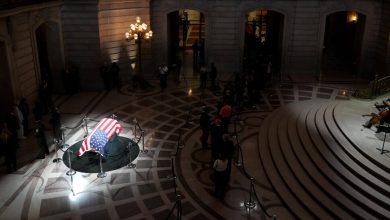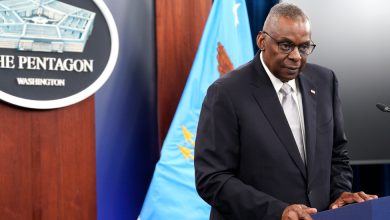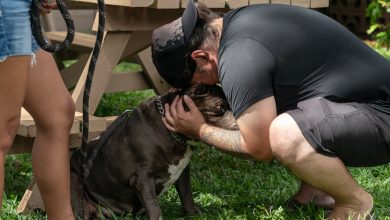Vitaliy Kim, Master Motivator and Symbol of Ukraine’s Resistance

MYKOLAIV, Ukraine — To win the war, says Vitaliy Kim, you need to love the war. “Love what you are doing, reconcile with the situation you are in, find something good in every circumstance, in small victories, in results.”
Mr. Kim, 41, the head of the regional military administration in the embattled southern city of Mykolaiv, offers the candid smile that has become the face of Ukraine’s resistance along the sweep of the Black Sea coast. It exudes a quiet confidence that says Russian missiles may hurt us, but they cannot dent the Ukrainian spirit.
Four months ago, Mykolaiv, a port that was once a hub of Soviet shipbuilding, was almost overrun as Russian forces surged out of annexed Crimea, taking the nearby city of Kherson. Mr. Kim responded, in daily video messages, with a phrase that became a watchword: “Good morning, we are from Ukraine!”
When you face a nuclear-armed power that is the largest state on Earth and is bent without regard for human life on your annihilation, unwavering belief in victory may be irrational. It is also essential to survival. Weapons alone, however urgently needed, will not turn the tide. Will is required.
“It was important to convey that the enemy was not as scary as it seemed, and to tell the world that we are here, that we exist,” Mr. Kim said in an interview conducted in a building close to the skeleton of the Mykolaiv regional administration building, which was hit by a Russian cruise missile in late March, killing 38 people.
The message worked. Mr. Kim quickly attracted almost half a million Instagram followers. Like Volodymyr Zelensky, the Ukrainian president who first lured the former businessman into politics, Mr. Kim had a way of lifting spirits.
“In the first days of the war, everyone was in a panic,” Mr. Kim said “Communications were bad.” He thought for a moment. “You know, if you are calm, you make the right decisions.”
Mykolaiv has held off Russia, but the price has been high, evident in blasted buildings and dead and wounded civilians and soldiers. More than half of its residents have fled. The mayor has advised those still in the city to leave, too.
Russian missiles, including 28 in a single night this week, cause periodic devastation. One hit a residential building early on Wednesday, killing at least four people, including a child. There is a lack of drinking water. Few of the estimated 230,000 people left in the city have work; most depend on food and clothes distributed by aid organizations.
Better Understand the Russia-Ukraine War
- History and Background: Here’s what to know about Russia and Ukraine’s relationship and the causes of the conflict.
- How the Battle Is Unfolding: Russian and Ukrainian forces are using a bevy of weapons as a deadly war of attrition grinds on in eastern Ukraine.
- Russia’s Brutal Strategy: An analysis of more than 1,000 photos found that Russia has used hundreds of weapons in Ukraine that are widely banned by international treaties.
- Outside Pressures: Governments, sports organizations and businesses are taking steps to punish Russia. Here are some of the sanctions adopted so far and a list of companies that have pulled out of the country.
- Stay Updated: To receive the latest updates on the war in your inbox, sign up here. The Times has also launched a Telegram channel to make its journalism more accessible around the world.
Yet the phrase perhaps most commonly heard in Ukraine — “We will win” — is a regular refrain on Mykolaiv’s ghostly streets.
Mr. Kim’s decisions, and the confidence he has conveyed, have helped turn back Russian forces, hold them at bay, frustrate their desire to seize the entire Black Sea Coast and rally a city that, like the northeastern industrial city of Kharkiv, has become a symbol of Ukrainian defiance.
The city, Mr. Kim said, is now “ready and prepared and the chances of Russia taking it are not very big,” though the bombardment continues.
As for a counterattack, it will require long-range weapons that Ukraine does not yet have, and more ammunition, he conceded. If Kherson were recaptured from Russia, the war would look different, but that will not happen tomorrow. Ukraine’s forces are badly depleted, but so are Russia’s, and resignation is not an option.
A photograph of Mr. Kim, looking utterly relaxed with his shoeless feet up on his desk in multicolored socks, went viral. Memes multiplied. A doctored one showed him with his feet up at one end of the 20-foot-long anti-Covid table used by President Vladimir V. Putin of Russia in the Kremlin. Mr. Putin sits hunched and tensed at the other end, an autocrat reduced to a supplicant.
Mr. Kim has called the Russian Army “idiotic.” Alluding to the Russian coat of arms with its double-headed eagle, and the Ukrainian coat of arms with its three-pronged trident, he has said “a country with a chicken on its coat of arms will never defeat a country with a fork on its coat of arms.”
The mockery is relentless. It is also strategic. “I don’t say these things for fun, they are designed to make our military feel strong,” he said. “If you don’t care about something, that something no longer rules over you.”
Gera Grudev, a museum curator in Odesa whose partner, Bogdan Zinchenko designed a popular T-shirt with Mr. Kim’s image, said the “jokes and open-mindedness make Kim a perfect contrast to the Russian system, where nobody sits down with a leader for a casual chat.”
Mr. Kim attributes his calmness to his father, a man of Korean descent who was a basketball coach and later a physiotherapist and who was “a bit strict, democratically strict, I would say.” Regular lessons in taekwondo, a Korean martial art, instilled discipline. “You have a program, results you need to achieve, and I believe this helps a child grow in the right way,” Mr. Kim said.
Mr. Kim’s paternal forebears, like many Koreans from the Communist North, had moved to the Soviet Union to find work, settling first in Kazakhstan. As a young man, Mr. Kim’s father moved to the Crimean capital of Simferopol to attend college. There he met Mr. Kim’s mother, and the couple later moved to Mykolaiv, where their son was born.
Mr. Kim had a successful career in construction, agriculture and catering before Mr. Zelensky appointed him regional administrator in 2020. Convinced of the need to eliminate corruption, overhaul the court system and reinforce the rule of law in Ukraine, he accepted the job, never imagining it would become military in character.
Now he wears an olive green T-shirt with “Chernobaivka” emblazoned on it — the name of a village where Ukraine has repeatedly inflicted heavy losses on Russia. He puffs from time to time on an electronic cigarette.
“The war will go on until our victory,” Mr. Kim said. “If, or rather when, we win, Russia will be stopped for a long time, and the Putin system will fall.” And what is victory? “Turning Russia back to the borders of Feb. 23, and in time, regaining all our territory and people.”
For Mr. Kim, Ukraine has a great future as a fully European country. Its problem is it has a bad neighbor. The war has made it clear that Ukraine and Russia are not linked in some mystical union, whatever the bonds of family and culture, but are dissimilar, imbued now with “different minds, different goals and different rules,” he said. Russia, he added, wanted this war to mask the failings of its own system.
“You know the Russian mentality is, ‘We don’t need to be better than our neighbor. It’s enough for our neighbor to be worse than us,’” Mr. Kim said. A thriving Ukraine would pose an overwhelming question to Mr. Putin: Why can Russians not have what Ukraine has? To that, the Russian leader would have no answer. Hence, according to Mr. Kim, the cruise missiles fired on Kyiv, Mykolaiv and countless other Ukrainian cities.
“Democratic and authoritarian countries are different,” Mr. Kim said. “In a democratic country, people have laws, aspire to live well, and criticize their leader. In North Korea and Russia, everyone lives badly but loves their leader very much.”
I asked about his wife and three children. They left; he has not seen them for three months. Did they go abroad? “Yes and no,” Mr. Kim says. He is not about to give anything away.
“I don’t care about situations or things that I can’t control or influence,” he said. “Only my zone of responsibility, and that I work on all the time. I can’t control whether Putin is alive or dead. What I know is that when he dies I will be happy.”





